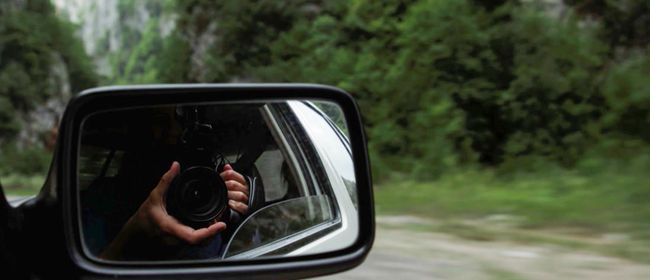The stories extracted are often harrowing or difficult. Johnson has filmed documentaries about the trial of the murderers of James Byrd, abortion clinics in the south, and about her own mother’s battle with Alzheimer’s, and that’s just within the US. Outside of the country, she’s spent time in post-war Bosnia, post-genocide Rwanda, and within the active war zones of Yemen and Afghanistan. So much of these spliced-together segments take place during interview prep or in the collection of B-roll, and if this is what was taken out, what was left in must have been pure gold. The prosecutors in the Byrd murder trial are so addled by the crime scene photographs, mercifully kept offscreen, that their discomfort tightens the viewer’s neck muscles. A cheerful Afghani boy of around 13 or 14, blinded in one eye by shrapnel, is coached to describe the incident in Dari, instead of English, which he’s fluent in, and though Johnson can’t understand him, his body language still makes her cry. When there aren’t survivors to speak to, Johnson goes to places where mass atrocities have taken place or were planned, splicing together a series of locations in a stunning montage. They’re just buildings or creek beds without context, but the way they’re presented fills each frame with a reverberating psychic energy still potent enough to infect the person visiting and the person watching said visit on their TV’s thousands of miles away.
Johnson is always building some sort of personal connection to whatever she’s filming, but it’s the scenes in Bosnia that take up a larger and larger part of Cameraperson. Her director on that project tells her the emphasis is supposed to be of bullet-ridden mosques and gravestones dating to the 90’s, and the film contains plenty of bearing witness to vast human cruelty in this part of the world, but Johnson keeps returning to a Muslim family of blueberry farmers, one of the few to return after the war. She’s there to watch as a young boy plays with an ax around an even younger sibling, tsking when it looks like he’s about to hit himself in the face with it (he doesn’t, everything’s fine) and she’s there with the family matriarch, changing the subject to her considerable sense of personal style when Johnson senses that talk of the war is making her uncomfortable. A film spliced together from years of footage is going to have montages in it, and the Bosnian farm is the setting for one worthy of Terence Malick, a rural idyll in a place that was impossibly dangerous for this family only a few years prior and now, in the film’s penultimate scene, serves as the setting for an impossibly beautiful and affecting conversation between two mothers. Those psychic stains of atrocity still exist in their village, but they don’t have to preclude some amount of forgiveness, or at least the type implied by living well in the shadow of those atrocities.
Late in Cameraperson, Johnson includes a conversation with an exiled Syrian dissident about what the media should show of human suffering. The root facts of any given case are described as little more than voyeurism, robbing the sufferer or the dead of their dignity while also serving as shock value that could potentially be manipulated for any purpose, good or ill. Want to demonize immigrants, wait for a crime to happen perpetrated by one and then crow about the bloody details. The dissident insists that there must be a way to represent death without showing the actuality of it, and Johnson’s film finds that way, indescribable and poetic though it may be. One feels wrung out after watching Cameraperson, like they’ve been in the rooms and looked at the pictures, but Johnson also conveys the high winds at her mother’s ranch and the cool air of the blueberry farm. Maybe TV journalists need to go to cinematography school to achieve what the dissident is talking about, because Johnson gets it. For how it bridges the gap between the camera and the viewer and the subject, and for how evocative so much of Johnson’s footage is, Cameraperson is the best documentary of the last decade, and is in the conversation for best of the 21st century. A

 RSS Feed
RSS Feed